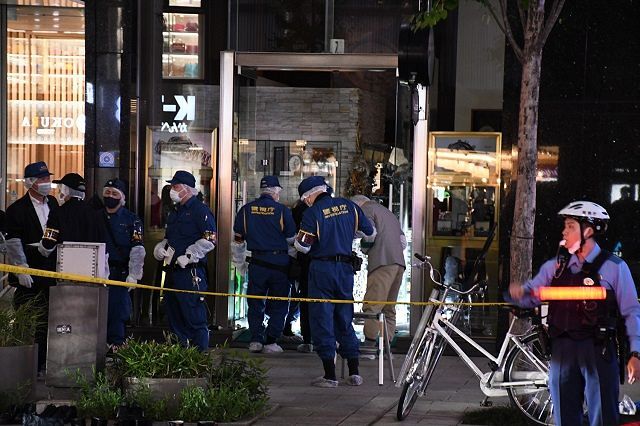A Rare Heist in a Country Known for Safety Puts Citizens on Edge
Japan is renowned for its low crime rates and reputation as a safe haven. However, a recent robbery at a high-end watch store in Tokyo’s prestigious Ginza district has shaken the country. The thieves executed a meticulously planned heist, assigning specific roles to each member of the group and making off with over ¥250 million worth of stolen merchandise. This rare Japan heist has raised concerns about security measures and potential implications for Japan’s image as a safe society.
What Happened
On the 8th of May, masked perpetrators forcibly entered a Ginza luxury watch store. Once inside, one member of the group acted as an enforcer, brandishing a knife to intimidate the store staff, while two others swiftly shattered the display cases using a crowbar and seized the valuable merchandise before eventually making their escape in a car with the goods in tow. The stolen goods consisted of over 70 watches, resulting in a staggering loss of approximately ¥250 million. The Tokyo Metropolitan Police Department is currently investigating the predetermined division of responsibilities, which includes coercion and theft, to understand the extent of each individual’s involvement in the crime.
Arrests and Recovery of Stolen Goods
The Tokyo Metropolitan Police Department swiftly apprehended four individuals, aged between 16 and 19, on suspicion of trespassing in an apartment near the location where the getaway car was abandoned. These arrests shed light on a potential connection to the robbery. During the ongoing investigation, authorities discovered some of the stolen watches hidden in the bushes near the apartment complex. Additionally, a bag containing approximately 40 watches was found inside the abandoned vehicle. As a result, a significant portion of the stolen merchandise has been successfully recovered.
No Familiarity (or Honor) Among Thieves?
An intriguing development in the case is that the four individuals arrested for trespassing claim to be unfamiliar with each other. Despite residing in Yokohama city, they assert no prior knowledge of their fellow suspects. The Tokyo Metropolitan Police Department is delving deeper into this aspect and exploring the possibility of unknown accomplices or a more extensive criminal network involved in the robbery. The backgrounds of the arrested individuals vary, including high school students, restaurant part-time workers, and the unemployed. This diversity, coupled with the absence of apparent connections such as shared schools or backgrounds, raises suspicions about their involvement in criminal activities. Law enforcement agencies are currently analyzing the seized mobile phones to determine if the suspects responded to advertisements for illegal “underground part-time jobs” that recruit individuals for criminal purposes.
What a Heist in Japan Means for the Future
While large-scale crimes such as daytime robbery do exist in Japan, they are few and far between, making this particular incident stand out in the country known for clean streets and safe cities. Some passersby even managed to film the robbers as they smashed the glass containers for the watches. The clips quickly went viral on social media, with citizens expressing their concerns over safety and police response time.
As investigators continue their diligent efforts to unravel the complexities of this case, including the potential involvement of unknown accomplices and connections to illegal activities, Japan’s reputation as a safe society faces a critical test. The outcome of this investigation will not only determine justice for the victims but also shed light on the effectiveness of security measures and the resilience of Japan’s crime-prevention system. However, due to the swift action of the Tokyo Metropolitan Police Department, several suspects were immediately apprehended and a large majority of the stolen goods were recovered. Such a flashy crime certainly stands out in Japan, but thanks to the speed at which those involved were apprehended, I hope such incidents will remain a rarity.
More Stories from Japan Insider









